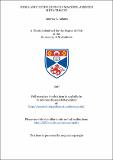Tools and techniques for machine-assisted meta-theory
Abstract
Machine-assisted formal proofs are becoming commonplace in certain fields of mathematics and theoretical computer science. New formal systems and variations on old ones are constantly invented. The meta-theory of such systems, i.e. proofs about the system as opposed to proofs within the system, are mostly done informally with a pen and paper. Yet the meta-theory of deductive systems is an area which would obviously benefit from machine support for formal proof. Is the software currently available sufficiently powerful yet easy enough to use to make machine assistance for formal meta-theory a viable proposition? This thesis presents work done by the author on formalizing proof theory from [DP97a] in various formal systems: SEQUEL [Tar93, Tar97], Isabelle [Pau94] and Coq [BB+96]. SEQUEL and Isabelle were found to be difficult to use for this type of work. In particular, the lack of automated production of induction principles in SEQUEL and Isabelle undermined confidence in the resulting formal proofs. Coq was found to be suitable for the formalisation methodology first chosen: the use of nameless dummy variables (de Bruijn indices) as pioneered in [dB72]. A second approach (inspired by the work of McKinna and Pollack [vBJMR94, MP97]) formalising named variables was also the subject of some initial work, and a comparison of these two approaches is presented. The formalisation was restricted to the implicational fragment of propositional logic. The informal theory has been extended to cover full propositional logic by Dyckhoff and Pinto, and extension of the formalisation using de Bruijn indices would appear to present few difficulties. An overview of other work in this area, in terms of both the tools and formalisation methods, is also presented. The theory formalised differs from other such work in that other formalisations have involved only one calculus. [DP97a] involves the relationships between three different calculi. There is consequently a much greater requirement for equality reasoning in the formalisation. It is concluded that a formalisation of any significance is still difficult, particularly one involving multiple calculi. No tools currently exist that allow for the easy representation of even quite simple systems in a way that fits human intuitions while still allowing for automatic derivation of induction principles. New work on integrating higher order abstract syntax and induction may be the way forward, although such work is still in the early stages.
Type
Thesis, PhD Doctor of Philosophy
Collections
Items in the St Andrews Research Repository are protected by copyright, with all rights reserved, unless otherwise indicated.

